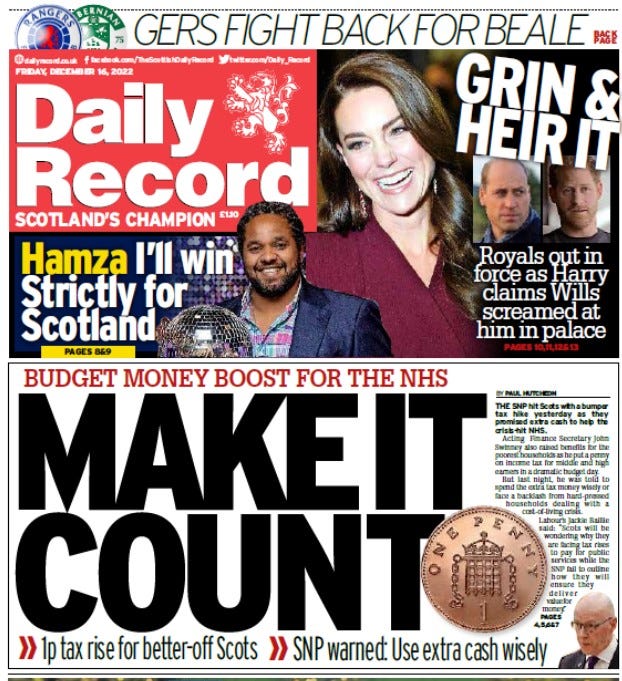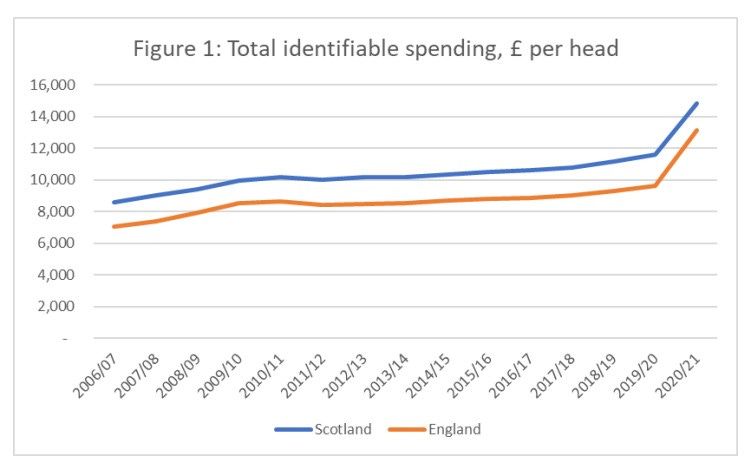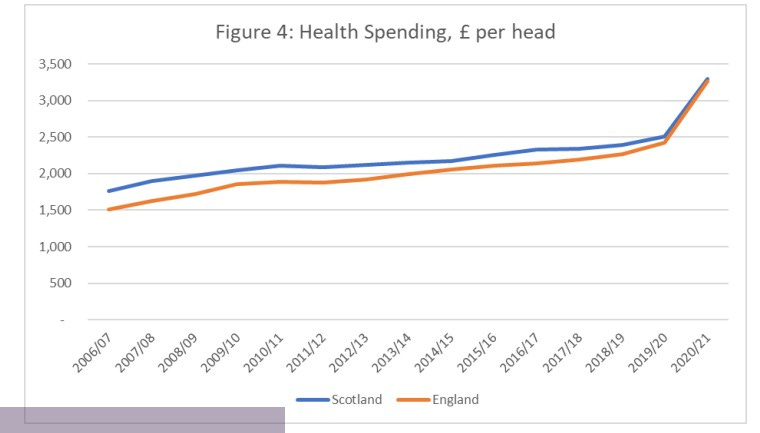The Baltic News 5
Swinney's tax gamble; where has Scotland's NHS money gone?: how Yes voters want to keep the Union.
Paying more - getting less?
AS Finance Secretary John Swinney announced plans to increase income tax on Thursday, the Scottish Government decided to release polling on attitudes to personal taxation.
Not surprisingly, given Mr Swinney was in the process of adding a penny onto the higher and upper rate of income tax in Scotland, the figures appeared to back him up.
The number of Scots who agree that ‘Government should redistribute income from the better off to those who are less well off’ has risen in the last year: from 59% to 67%.
More than half say they would prefer the Government to increase taxes and spend more, compared to just 8% who think we should reduce taxes and cut services.
And asked directly whether they’d be prepared to pay more tax to fund public services, or have lower taxes and cut public services, it is no contest: 47% to 18%.
So - it’s all looking good for Mr Swinney and his new tax grab? Is it the case that we progressive Scots are all desperate to hand over our hard-earned?
Well, up to a point.
It is one thing asking people in polls about whether they are generous individuals or not. It is quite another to take actual and literal cash out of their pay packets.
A warning to Mr Swinney about the problems ahead came on the front page of the Daily Record on Friday morning. Most SNP supporters and left-of-centre voters will probably give Mr Swinney the benefit of the doubt for now as he appeals to their progressive consciences. But if they don’t see evidence pretty damn quickly that it is having a beneficial impact, he might find that the social democratic instincts of the Scottish public are suddenly revealed to run a little shallow.
The specific issue for Mr Swinney is that he has connected the higher tax rates directly to extra cash for the NHS. Again, let us safely assume that the polling shows this is popular: Brits always say they are happy to pay more for the national religion.
But if the SNP is to “make it count”, we need to see quick improvements in the NHS very quickly. And here Mr Swinney’s bet no longer looks quite so safe.
Scottish health reforms which have been put forward – most notably the plan to create a new National Care Service – have disappeared into a Lansleyesque lacuna of confusion and uncertainty.
And while, in London, both Labour and Conservative leaders are talking about the need to drive more value for money into the NHS - handing managers more freedom to run hospitals as they wish, and using more independent provision to clear waiting backlogs - in Scotland we can expect the SNP to make the very lack of such reforms into a pious progressive article of faith.
In short, Mr Swinney has placed a very large and public bet that his cabinet colleague Humza Yousaf can use taxpayers’ money to get immediate improvements out of a NHS service currently facing the biggest backlog in its 75-year history, with no obvious evidence that the SNP is prepared to make some of the difficult decisions necessary to do so.
If the line sticks that we’re being run by a “pay more get less” government, perhaps those polls Mr Swinney published this week won’t read quite so comfortably for him.
Where has Scotland’s NHS cash gone?
On the subject of NHS spending, we published some figures this week which set out some of the long-term trends we’ve seen since devolution. The surprise is that for all our politicians genuflect before the NHS as the public’s number one priority it hasn’t actually done that well.
The big picture, as we all know, is that per head of population, Scotland sits pretty: spending by both Scottish and UK Governments has consistently been about 20% higher in Scotland than in England.
But now look at the spending for health, controlled entirely by the Scottish Government over the last 25 years (both Labour/Liberal and SNP).
As the figures show, in the year of the pandemic, our historic spending advantage over England finally ended: we now spend the same per head as our neighbours down south. This is a big deal: our researcher Andrew Mooney worked out that had we kept the spending advantage at the same level as in 2007, Scotland would now be spending £2bn a year extra on the NHS than it is now.
So where has that extra money gone?
Freebies for one thing: our research confirmed we spend vastly more on tertiary education than England thanks to the decision to abolish the graduate endowment and fund free tuition for all Scottish resident students.
Scotland also spends more relatively on adult social care (again, some of it free such as personal care) and on law and order.
Since devolution, budgets on these issues have been prioritised over the NHS.
The rather troubling matter for anyone involved in public services in Scotland is that a new kid on the block is now emerging which is also now demanding vast sums of cash from the pot: devolved benefits.
In the wake of “The Vow”, a whole host of benefits were devolved to the Scottish Government. These still get funded from the UK pot via the block grant adjustment but, as the Scottish Fiscal Commission revealed on Thursday, specific Scottish Government decisions to increase benefits here (such as the new child payment) are now going to exceed UK funding by three quarters of a billion pounds.
And that will undoubtedly keep rising too.
This money has to come from somewhere and it looks like Scotland’s Local Authorities are the – once again – going to be the fall guy. There will be far bigger cuts to their services than we’re seeing elsewhere in the UK. The new benefits system is the reason - as the Institute of Fiscal Studies said this week.
The Scottish Government’s middle class freebies and Scottish branded benefits are hugely popular and, in the case of the child payment, hugely beneficial to Scotland’s neediest families, but the fall out from this week’s budget shows they are likely going to come at a very big cost - either in cuts to local services or massive increases in council tax next year.
Yes voters want to keep most of the Union
AS has been noted by several commentators, Gordon Brown’s mammoth plan to reform the UK last week is a bit like Christmas day lunch – it takes a while to digest. There is a lot in there. It includes one table which hasn’t had much attention but which I think provides a useful insight into what is going in Scotland with the independence debate. It comes from the polling carried out for the Commission by Henry Stannard at Our Scottish Future.
Here it is. The numbers weren’t in the report but I’ve included them here:
As it says, the poll asked people in Scotland what elements of the UK they’d like to keep no matter what happens constitutionally. The surprise wasn’t that most Scots agreed they wanted to keep most of the benefits of the UK state – such as the Armed Forces, a friction-free border, the welfare state, the Pensions – but that so did Yes voters. Indeed, when it comes to actually getting rid of elements of the UK, the only things they said they were keen to dump was a UK wide approach to immigration, UK funding for economic growth, Team GB, and the Monarchy.
It’s a reminder that the nationalist cause in Scotland is not being fuelled by a great grass roots demand for what you might call institutional sovereignty. There isn’t a great desire out there to start our new Scottish MI6 or to claim our new Scottish passport. The things Yes voters really don’t like are what might be seen as symbols of Britishness: the Royal Family and Olympic teams. They want to keep the rest, same as everyone else.
Why, then, do these people want independence? That’s for another post but I take two lessons from the table: firstly, it is obviously encouraging for the pro-UK side that most Yes voters in Scotland want to keep most of the UK intact. It shows there is room here for common ground. But secondly, it suggests to me that simply having the right building blocks in place, and then pointing to them, is not going to be enough for Yes voters to change their minds and agree they want to remain in the UK. They may like the parts, but they don’t like the sum. And the sum needs work.
Or, to quote Eric Morecambe, the Union may well be playing the right notes but not necessarily in the right order.
ENDS








Eddie - as long as we continue to use the word independence we are giving the nationalists a free ride. There is no completely independent country in the world. The life of every country is conditioned both by what happens inside the country and what other countries do and so influencing and working with them is just as important as those matters on which truly independent decisions can be taken.
"Independence" enables the SNP to disguise the true nature of what they want to do. They want to embroil Scotland in incredibly complicated Brexit style negotiations to rejig the legal basis of our essential relationship with the UK. That is clearly not just a matter for Scotland alone.
Therefore Nicola's referendum is not the exercise in democracy she claims. It is wrongly worded and the absence of a confirmatory vote means a commitment can be extracted from voters on the basis of promises which can be jettisoned after the referendum. "Indyref" is not the joyous popular event portrayed. Just like Brexit it is manipulative and deceitful.